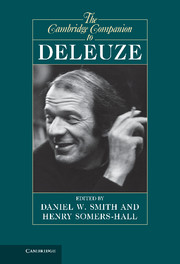Book contents
- Frontmatter
- Contents
- Contributors
- Abbreviations
- Introduction
- 1 Deleuze and the history of philosophy
- 2 Difference and Repetition
- 3 The Deleuzian reversal of Platonism
- 4 Deleuze and Kant
- 5 Phenomenology and metaphysics, and chaos
- 6 Deleuze and structuralism
- 7 Deleuze and Guattari
- 8 Nomadic ethics
- 9 Deleuze’s political philosophy
- 10 Deleuze, mathematics, and realist ontology
- 11 Deleuze and life
- 12 Deleuze’s aesthetics of sensation
- 13 Deleuze and literature
- 14 Deleuze and psychoanalysis
- 15 Deleuze’s philosophical heritage
- Bibliography
- Index
- References
9 - Deleuze’s political philosophy
Published online by Cambridge University Press: 05 December 2012
- Frontmatter
- Contents
- Contributors
- Abbreviations
- Introduction
- 1 Deleuze and the history of philosophy
- 2 Difference and Repetition
- 3 The Deleuzian reversal of Platonism
- 4 Deleuze and Kant
- 5 Phenomenology and metaphysics, and chaos
- 6 Deleuze and structuralism
- 7 Deleuze and Guattari
- 8 Nomadic ethics
- 9 Deleuze’s political philosophy
- 10 Deleuze, mathematics, and realist ontology
- 11 Deleuze and life
- 12 Deleuze’s aesthetics of sensation
- 13 Deleuze and literature
- 14 Deleuze and psychoanalysis
- 15 Deleuze’s philosophical heritage
- Bibliography
- Index
- References
Summary
Much of Deleuze’s work, especially the books co-authored with Guattari, has been read as political philosophy. Deleuze clearly viewed their initial collaboration in this light. In a 1990 interview with Antonio Negri, “Control and Becoming,” he remarked that “Anti-Oedipus was from beginning to end a work of political philosophy” (N 170). Their biographer, François Dosse, goes even further in suggesting that all of Deleuze’s work, “from his first works on Hume to his final reflections on the virtual, is inscribed in the space of the political.” However, not everyone accepts this image of Deleuze as a thoroughly political thinker. Slavoj Žižek argues that “not a single one of Deleuze’s own texts is in any way directly political; Deleuze ‘in himself’ is a highly elitist author, indifferent toward politics.”
Alain Badiou outlines several reasons for doubting whether Deleuze was first and foremost a political thinker and even whether there is such a thing as a Deleuzian politics. A first difficulty is that Deleuze never identified the political as a specific object or domain of thought, in the same way that, in What is Philosophy?, he singled out art, science, and philosophy. A second, more subjective difficulty is that Deleuze was never very interested in politics. In his solo writings, he never claimed that politics determined his philosophical activity. Unlike many of his contemporaries, such as Althusser, Derrida, Lyotard, or Nancy, he never argued that the primary purpose of philosophy was political. On the contrary, he tended towards a more traditional view of philosophy as the creation of concepts and suggested in a 1985 interview that he was interested in “the relations between the arts, science and philosophy” (N 123).
- Type
- Chapter
- Information
- The Cambridge Companion to Deleuze , pp. 198 - 219Publisher: Cambridge University PressPrint publication year: 2012
References
- 7
- Cited by



